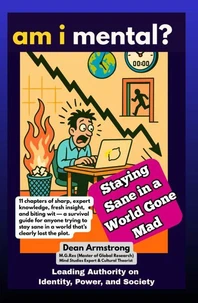I'm Not Racist, I Want My Country Back! How Race, Power, and Nostalgia Shape the World We Live InPrint edition: A clear, unsentimental investigation into racism and race relations, white privilege and systemic bias, nationalism and populism, colonialism/empire and apartheid, immigration and borders, identity, belonging, mixed-race experience, politics and policing. Braiding narrative with systems thinking, this book shows how language, law, media, and code work together to produce advantage and exclusion-often invisibly, always consequentially.
What this paperback covers: cultural criticism and political commentary; decolonisation and reparations; media framing, propaganda, and algorithmic bias; British imperial legacies and French Algeria; South African apartheid and US civil rights; class, colourism, and the market for "morality"; how nostalgia fuels grievance and "take our country back" politics. It's rigorous yet readable, provocative yet fair-designed for reading groups, students of sociology and cultural theory, and anyone who prefers clarity over comfort.
Inside each chapter: Racism 2.0 - Unpacked - historical, sociological, and policy context The Mirror Test - a practical reflection or provocation you can apply today Across the Divide - fiction meets reality via four families: the Grants (England), the Whitemans (South Africa), the Bakiris (France), the Washingtons (USA) Global Snapshot - Meanwhile. - concise world examples Podcast Teaser - Mini-Story - an audio-friendly scene to continue the conversation Why it matters now: In a noisy era of "culture wars", the book cuts through slogans to expose incentives, defaults, and feedback loops-how institutions, platforms, and policies entrench inequality while claiming neutrality.
It offers a usable vocabulary for discussing race, nationalism, immigration, allyship, media bias, and algorithmic decision-making without euphemism or moral panic. Who will value this book: readers of anti-racism and social justice; students of history, political science, and sociology; journalists, educators, and policy practitioners; people navigating multicultural, mixed-race, or adopted identities; anyone curious about decolonisation, reparations, and the difference between intention and impact.
Tone & approach: thought-provoking, meticulously sourced in spirit (no jargon-dump), with dry wit and moments of satire to make difficult truths readable. It invites debate, not tribalism-tools, not talking points. Paperback features: clean, minimalist interior; highly legible typography (Arimo family), considered headings and spacing for long-form reading; consistent chapter architecture for quick reference; print-friendly design for annotation and study.
Keywords woven naturally: racism; race relations; white privilege; systemic racism; colonialism and empire; apartheid; nationalism and populism; immigration and borders; mixed-race memoir themes; adoption stories; cultural critique; political commentary; sociology; cultural theory; media studies; propaganda; algorithmic bias; decolonisation; reparations; identity and belonging; critical thinking; uncomfortable must-read non-fiction. If you're ready to swap comfort for clarity-to test assumptions, map mechanisms, and imagine repair-this paperback is your guide. Read it.
Debate it. Have a laugh. Pass it on.
I'm Not Racist, I Want My Country Back! How Race, Power, and Nostalgia Shape the World We Live InPrint edition: A clear, unsentimental investigation into racism and race relations, white privilege and systemic bias, nationalism and populism, colonialism/empire and apartheid, immigration and borders, identity, belonging, mixed-race experience, politics and policing. Braiding narrative with systems thinking, this book shows how language, law, media, and code work together to produce advantage and exclusion-often invisibly, always consequentially.
What this paperback covers: cultural criticism and political commentary; decolonisation and reparations; media framing, propaganda, and algorithmic bias; British imperial legacies and French Algeria; South African apartheid and US civil rights; class, colourism, and the market for "morality"; how nostalgia fuels grievance and "take our country back" politics. It's rigorous yet readable, provocative yet fair-designed for reading groups, students of sociology and cultural theory, and anyone who prefers clarity over comfort.
Inside each chapter: Racism 2.0 - Unpacked - historical, sociological, and policy context The Mirror Test - a practical reflection or provocation you can apply today Across the Divide - fiction meets reality via four families: the Grants (England), the Whitemans (South Africa), the Bakiris (France), the Washingtons (USA) Global Snapshot - Meanwhile. - concise world examples Podcast Teaser - Mini-Story - an audio-friendly scene to continue the conversation Why it matters now: In a noisy era of "culture wars", the book cuts through slogans to expose incentives, defaults, and feedback loops-how institutions, platforms, and policies entrench inequality while claiming neutrality.
It offers a usable vocabulary for discussing race, nationalism, immigration, allyship, media bias, and algorithmic decision-making without euphemism or moral panic. Who will value this book: readers of anti-racism and social justice; students of history, political science, and sociology; journalists, educators, and policy practitioners; people navigating multicultural, mixed-race, or adopted identities; anyone curious about decolonisation, reparations, and the difference between intention and impact.
Tone & approach: thought-provoking, meticulously sourced in spirit (no jargon-dump), with dry wit and moments of satire to make difficult truths readable. It invites debate, not tribalism-tools, not talking points. Paperback features: clean, minimalist interior; highly legible typography (Arimo family), considered headings and spacing for long-form reading; consistent chapter architecture for quick reference; print-friendly design for annotation and study.
Keywords woven naturally: racism; race relations; white privilege; systemic racism; colonialism and empire; apartheid; nationalism and populism; immigration and borders; mixed-race memoir themes; adoption stories; cultural critique; political commentary; sociology; cultural theory; media studies; propaganda; algorithmic bias; decolonisation; reparations; identity and belonging; critical thinking; uncomfortable must-read non-fiction. If you're ready to swap comfort for clarity-to test assumptions, map mechanisms, and imagine repair-this paperback is your guide. Read it.
Debate it. Have a laugh. Pass it on.

 , qui est-ce ?
, qui est-ce ?